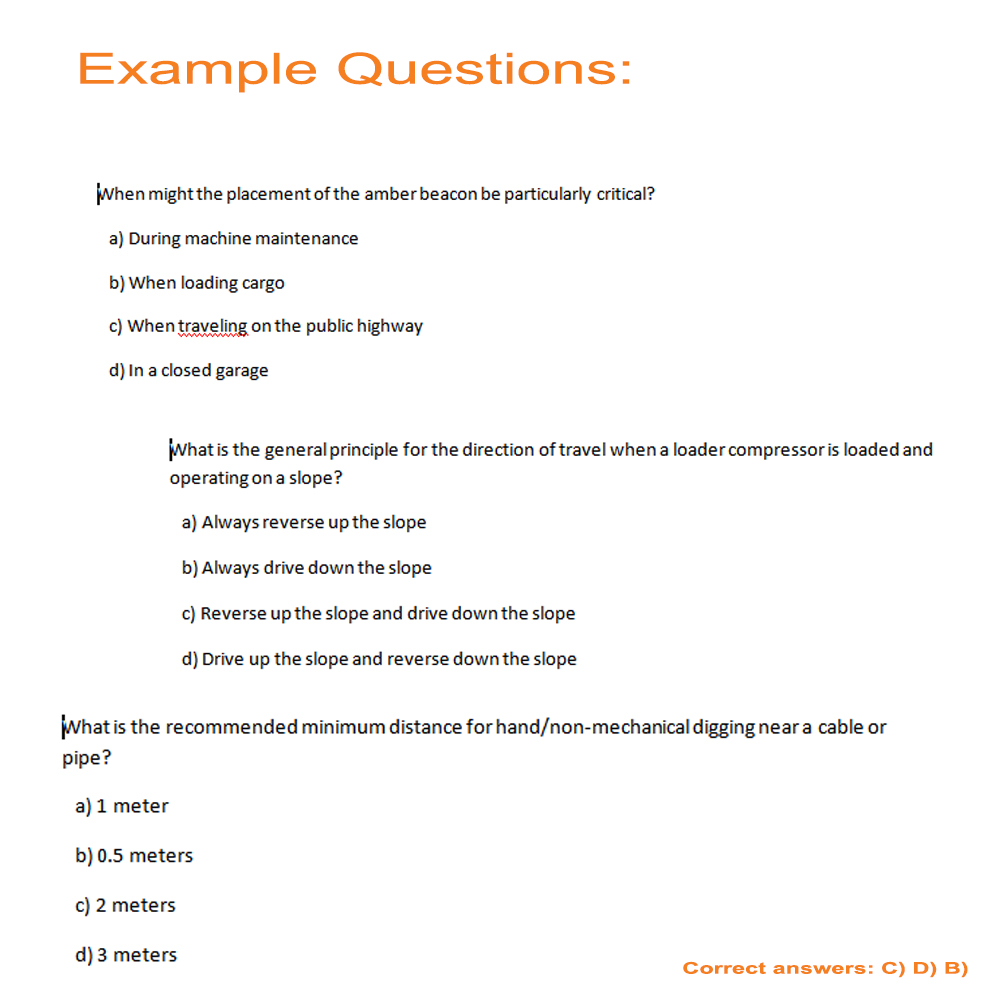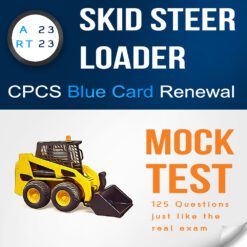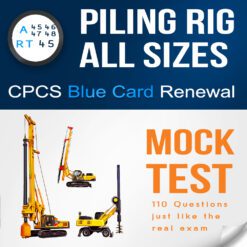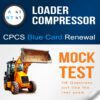RT41 CPCS Blue Card Renewal Mock Test with 118 Questions and Answers / A41 Loader Compressor
£15.00 Original price was: £15.00.£9.95Current price is: £9.95.
Practice for your RT41 CPCS blue card renewal test with practice multiple choice questions – Just like the real NOCN/CPCS test!
- Questions & Answers: based on the latest RT 41 Loader Compressor – CPCS Renewal Test Revision FACTSHEET
- Categories: A 41 – Loader Compressor
- Number of Multiple-choice Questions: 118
- Format: PDF
- Delivery time: Instant download after checkout
- Refunds: No refunds once downloaded, unless you ordered duplicates by mistake.
If there are any issues with your download, please email CardRenewalTest@gmail.com and we’ll send it ASAP
Ace Your RT41 Loader Compressor CPCS Blue Card Renewal with Our Mock Practice Test!
Why You Need This Practice Test
Are you a Loader Compressor operator looking to renew your CPCS blue card? Renewing your certification is essential for maintaining your skills and staying compliant with industry standards. The RT41 Loader Compressor CPCS blue card renewal test can be a challenging hurdle to overcome, but we’re here to help you prepare and succeed.
What You’ll Learn from Our Mock Practice Test
Staying up-to-date with the latest industry knowledge is crucial, and that’s where our CPCS blue card renewal mock practice test comes into play. Let’s explore what you can gain from this invaluable resource:
- Comprehensive Coverage:
Our practice test is based on the latest NOCN CPCS RT41 Loader Compressor factsheet. You’ll receive questions covering a wide range of topics relevant to your role, ensuring that you’re well-prepared for the real test. - Realistic Exam Experience:
Familiarize yourself with the format and types of questions you’ll encounter in the actual RT41 Loader Compressor renewal test. This realistic experience will boost your confidence and help reduce anxiety on test day. - In-Depth Learning:
As you work through the practice questions, you’ll not only test your knowledge but also gain insights into important safety procedures, best practices, and regulations. It’s like a mini refresher course! - Instant Feedback:
Our mock practice test provides immediate feedback, letting you know which questions you answered correctly and where you may need to brush up on your knowledge. This allows you to focus your study efforts more efficiently. - Convenience and Flexibility:
Study at your own pace, whenever and wherever you want. Our practice test is accessible online, making it easy to fit your preparation into your busy schedule. - Affordable and Accessible:
Compared to other study resources, our mock practice test is an affordable option that offers great value for your money. Plus, it’s easily accessible on our website, cardrenewaltest.co.uk.
Who Should Use Our Mock Practice Test?
Our practice test is tailored for Loader Compressor operators seeking to renew their CPCS blue card. Whether you’re a seasoned professional or relatively new to the industry, this resource is designed to help you succeed in your renewal journey.
Renewing your CPCS blue card doesn’t have to be a daunting task. With our RT41 Loader Compressor CPCS blue card renewal mock practice test, you’ll gain the confidence and knowledge you need to ace the real exam. Stay on top of industry standards, refresh your skills, and ensure that you’re operating your Loader Compressor safely and efficiently.
Don’t wait until the last minute—start your preparation today with our mock practice test and be well-prepared for your CPCS blue card renewal. Get ready to demonstrate your expertise and commitment to safety in the workplace!
Key learning points from the official RT41 Loader Compressor factsheet:
Preparation for Work (Preparation):
- Loader Compressor Usage: Loader compressors are commonly used in road building and utility sectors for loading and breaking tasks. They have evolved from agricultural tractors to purpose-built units on excavator or loading shovel chassis.
- Compressed Air Tool Safety: Operating compressed air-powered tools, such as hand-held breakers, requires care and attention to safety standards.
- Pre-Use Checks: It is vital to conduct pre-use checks in compliance with the manufacturer’s requirements to ensure machine performance and prevent accidents.
- Reporting Faults: Operators must promptly report any faults or defects they notice and refrain from using the machine until authorized. Even seemingly minor faults can have significant consequences.
- Safety Struts: When raising loader arms for certain checks, ensure that the safety strut is fitted to prevent accidental lowering of the arms.
- Visibility: Clear vision is crucial for safe operation, and cleaning the windows should be done regularly, even if it requires working at heights.
- Safe Access: Consider safe access to the cab glass, such as using guard rail-equipped steps, to prevent accidents like tripping or slipping when climbing onto the loader arms.
- Highway Safety: Loader compressors often operate on public highways, necessitating the use of visible warning beacons, particularly from the rear of the machine.
Stability and Working Safely (Working Tasks):
- Vehicle Reversing: Reversing vehicles pose a significant safety risk, and eliminating reversing should be the first approach. If not feasible, minimize reversing in controlled areas.
- Pedestrian Safety: Plan travel routes to segregate pedestrians from loader compressor routes to avoid contact.
- Adaptation to Weather: Account for changing road and work surface conditions, especially during wet weather, to prevent accidents.
- Sideways Overturn: Be cautious of the machine’s center of gravity exceeding the wheel track, which can lead to sideways overturns, especially with a raised front bucket on uneven ground.
- Loading Vehicles: Carefully load vehicles on firm and level ground to prevent accidents during tipping.
- Proximity to Power Lines: Maintain specified distances from overhead power lines to reduce the risk of arcing.
- Engine Shutdown: Good practice recommends switching off the engine when leaving the cab to prevent unintentional movements of hydraulic components or the machine.
- ROPS: Loader compressors are equipped with a roll-over protective structure (ROPS) to minimize operator injuries in case of rollovers, provided the seatbelt is worn.
- Gradient Travel: Follow the manufacturer’s recommendations for correct travel direction on gradients, based on machine load.
- Slope Stability: Be aware that tipping a load while facing down a slope can make the machine less stable, potentially causing it to rear or tip up.
Powered Tool Safety:
- Power Tool Usage: When using power tools like breakers, address safety concerns such as noise, manual handling, dust, and vibration. Control measures are necessary to minimize health risks.
- Vibration Hazards: Hand arm vibration from hand-held breakers is a long-term health hazard. Consider machine-mounted breakers or vibration-reducing tools.
Below-Ground Digging:
- Underground Service Checks: Thoroughly check for underground services before digging, consulting utility and service providers, and using cable avoidance tools. Trial digs may be required.
- Limitations of Detection: Be aware that some cable avoidance tools have limitations in detecting certain types of services.
- Safety Distances: When the location of a service is known, follow recommended safety distances and conditions, especially when working near cables or pipes.
- Whip-Check Cable: Attach a whip-check cable between the air hose and the breaker to prevent injuries from an unplanned hose disconnection.
- Tool Selection: Choose the correct tool for breaking duties based on efficiency and safety requirements.
- Varied Contact: To work efficiently, vary the point of contact with the breaker, with a recommended maximum of 25 seconds before moving to another area.
These points cover a wide range of essential knowledge for Loader Compressor operators and ensure safe and effective operation in various scenarios.
2 reviews for RT41 CPCS Blue Card Renewal Mock Test with 118 Questions and Answers / A41 Loader Compressor
Add a review Cancel reply
Related products
CPCS Blue Card Renewal Tests
RT30 CPCS Blue Card Renewal Mock Test with 113 Questions and Answers / A30 Piling Rig Tripod
CPCS Blue Card Renewal Tests
RT42 CPCS Blue Card Renewal Mock Test with 117 Questions and Answers / A42 Crusher
CPCS Blue Card Renewal Tests
RT17 CPCS Blue Card Renewal Mock Test with 144 Questions and Answers / A17 Telescopic Handler
CPCS Blue Card Renewal Tests
RT23 CPCS Blue Card Renewal Mock Test with 125 Questions and Answers / A23 Skid Steer Loader
CPCS Blue Card Renewal Tests
RT45 CPCS Blue Card Renewal Mock Test with 110 Questions and Answers / A 45,46,47,48 Piling Rig
CPCS Blue Card Renewal Tests
CPCS Blue Card Renewal Tests
CPCS Blue Card Renewal Tests

















Sio –
good material
Grace –
What an awesome idea! I wish you had this 1 yr ago my son struggled to pass.